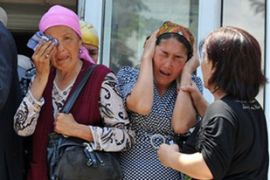Kyrgyzstan’s president sworn in
Roza Otunbayeva will govern the strife-torn country until December 31, 2011.

But it will be a challenging few months for Otunbayeva as the country struggles with political uncertainty and persistent insecurity in the south.
The southern city of Osh, the site of several days of ethnic clashes between ethnic Kyrgyz and Uzbeks last month, is partially in ruins. The city remains tense with scattered gunfire still being heard after nightfall, despite a curfew that will remain in effect until August 10.
The official death toll from the clashes is 294, but unofficially it is much higher – perhaps as many as 2,000 people were killed in the violence.
Investigation begins
The Kyrgyz government has slowly begun to investigate the causes of the violence.
Residents of Uzbek neighbourhoods complain that they have been singled out by this investigation, and several people have died in raids, according to local human-rights workers.
Army and police officials deny that their investigation has been heavy handed.
“Everything is done within the law,” said Kursan Asanov, the Kyrgyz army commander in Osh. “Many write that Uzbeks are being beaten up and so forth. That is not true.”
| IN DEPTH | |||||||||||
|
Otunbayeva created a commission last month to investigate the violence.
The US and the UN have called for an independent investigation, but the Kyrgyz government has so far resisted.
The New York Times reported on Friday that several Uzbek leaders who accused the police and army of complicity in the violence have been arrested.
Many witnesses to the fighting claimed that police and army units failed to stop it or, worse, that they took part themselves.
More than 2,000 soldiers have now been deployed in Osh to keep the fragile peace. But their presence might be far from reassuring, given the widespread mistrust among the Uzbek population.
“Recent actions by government forces have reinforced the perception in the Uzbek communities that they cannot trust the law enforcement authorities to be objective,” Human Rights Watch said in a statement.
“Many Uzbeks told us they believed security forces either perpetrated the attacks or deliberately turned a blind eye to them.”
Reforms in doubt
Observers are also unsure how the Kyrgyz government will implement the political reforms spelled out in the new constitution.
The country’s three main political parties shared a common goal of ousting Kurmanbek Bakiyev, the former president who left in April.
But their co-operation will shift to competition as they vie for seats in parliament.
Al Jazeera’s Robin Forestier-Walker reports on long-standing ethnic tensions in the south
And it remains to be seen how the Uzbek population will engage in politics.
The constitution forbids any political party established along ethnic or religious lines.
But Uzbeks will want a presence in the new government, particularly after last month’s ethnic violence.
Dmitri Medvedev, the Russian president, said earlier this week at the G20 summit that he has little confidence in Kyrgyzstan’s nascent democracy.
Medvedev said he “do[es] not really understand how a parliamentary republic will look and work in Kyrgyzstan”.
“Will this not lead to a chain of external problems? To reshuffles in parliament, to the rise to power of this or that political group, to authority being passed constantly from one hand to another?”
